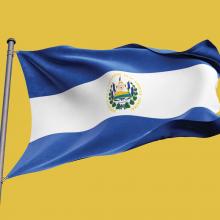Commentary
IN 2016, our church in San Salvador was preparing to host a group of young adults on a “mission trip” from the United States. Just prior to their travel, the U.S. government suspended the Peace Corps program in El Salvador due to security concerns related to gang violence. As the host church, we decided the mission trip should be canceled too. In 2015, the murder rate in my country peaked at 103 per 100,000, making it the most dangerous country in the world.
Over the last seven years, El Salvador has seen a rapid drop in its murder rate. In early 2023, President Nayib Bukele claimed that the country had accumulated 365 nonconsecutive days with zero homicides since he took office in June 2019. While it’s impossible to independently corroborate Bukele’s claim, it’s undeniable that Salvadorans are experiencing a new sense of safety and “peace.” That sense of peace, however, has come at a grave cost.
As of January 2023, El Salvador had the highest incarceration rate in the world. Approximately 61,000 people, including 1,082 minors, have been swept up in mass arrests since March 2022, when congress allowed Bukele to suspend constitutional rights. Salvadorans no longer have rights to free assembly, due process, access to lawyers, and previously protected freedoms. Nearly two percent of the Salvadoran adult population is in prison in conditions that fail to meet the U.N.’s minimum standards for imprisonment. Cristosal, a civil society human rights organization in El Salvador, has documented the death of 153 prisoners in state custody between March 2022 and March 2023, all detained during the same period. Of those, 29 died violent deaths and 46 “probable violent deaths” or under “suspicions of criminality,” reported Cristosal. More reports continue to roll in of the deaths of incarcerated people who also show signs of torture.
IN THE VAST and often overlooked landscapes of rural America, families face unique challenges. One critical issue stands out: the child care crisis. Our family-run produce farm in Ohio has been in production for 28 years. With three generations working to create a viable business to support our growing family, we know something about the need for child care in rural areas. The 2023 U.S. Farm Bill presents a crucial opportunity to address this pressing issue and foster early childhood development in rural communities.
The child care crisis is not unique to rural America, but rural Americans are more impacted by the lack of access to licensed child care. For example, 59 percent of rural communities are “child care deserts” compared to 56 percent of urban and 44 percent of suburban communities, according to a 2018 report by the Center for American Progress. In rural communities, families often struggle to find accessible, affordable, and high-quality options. Remote locations, limited infrastructure, and lack of providers exacerbate the challenges. The crisis not only hampers parents’ ability to work but also impedes the economic imperative to attract younger farm families to replace aging American farmers — more than half of whom are within a decade of retirement. The price of health insurance and the lack of child care make full-time farming out of reach for many younger Americans.
THROUGH THEIR EYES
In 2011, Raul Guerrero provided 100 Kodak disposable cameras and taught basic photography skills to nine young students in the Newlands area of Moshi, Tanzania. The Disposable Project book brings together their images of their community, with text by Guerrero. the-disposable-project.com
JOURNEYING
“Migration has been, for centuries, not only a source of controversy but a source of blessing,” Deirdre Cornell writes in Jesus Was a Migrant. Inspired by ministering among immigrants in different settings, this is a beautifully written set of deeply humanizing reflections on the immigrant experience and Christian spirituality. Orbis Books



